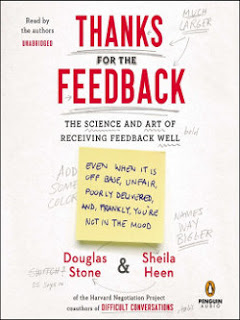Thanks for the Feedback is nonfiction. I checked it out on OverDrive.
Review:
I listened to this audiobook while working on other things, so I unfortunately can't give a very good overview of how it's structured. If I remember right, the authors started by laying out their definition of "feedback," which is broader than you might expect. Telling someone the ways in which they could improve the presentation they just practiced counts as feedback. So does telling them that they did great and are going to do just fine during the real thing (encouragement rather than advice). And that person who honked at you during your morning commute because you were zoned out and didn't notice the light had changed to green was also giving you feedback.
After that, I can't really remember much about their organization, although some things they wrote about really stuck with me. For example, I wasn't expecting them to touch on mental health, but they did, discussing the ways an anxious or depressed person's distorted thinking can make it difficult to change how they perceive feedback and advising that readers experiencing that kind of difficulty seek help. I appreciated that.
The authors' advice mostly boiled down to "calm down, shift your thinking about whatever feedback you just received that made you defensive, and try to find the kernels you can work with." In some cases, that involved getting clarification from the other person - about what they meant, the kind of feedback they were really giving you, etc. In other cases, it meant have a conversation with yourself and figuring out the ways in which this obviously wrong person might be right. And in some cases it involved having conversations with folks in which you deliberately addressed things (like feelings) that might otherwise have gone unspoken.
They admitted that some of the things they discussed probably wouldn't come naturally to most people. Some of it sounded so uncomfortable/unnatural to me that I figure I'd have to have a paper copy of this to remind me of enough of the details to even try to put it into practice. Unfortunately, if I remember right, the most uncomfortable/unnatural stuff was connected to the authors' advice for how to take a step back and shift your thinking, even when your knee-jerk reaction is to be defensive or upset. You know, the really hard part.
So yeah, at least parts of this book probably would have worked better in print than in audio, but I did still appreciate it overall. One of my favorite lines: "You aren't going from good to bad, or even from good to complicated. You've been complicated all along." I'll try to remember that the next time something shakes my sense of myself enough to have me anxiously fretting over whether this one thing indicates that I'm a "bad" person. I'm not good or bad - like other people, I'm complicated, and the question is what I can take from this moment, and whether I can learn and grow. (Wow, that sounds cheesy, but sometimes you need cheesy.)

No comments:
Post a Comment